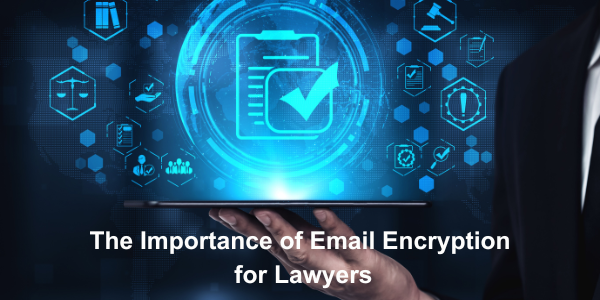Is Your Law Firm's Confidentiality at Risk?
The Importance of Email Encryption for Lawyers
Introduction:
In the labyrinth of legal proceedings, where every word carries weight and every document holds significance, safeguarding confidentiality is paramount. Yet, in the age of digital communication, where emails cross cyberspace at lightning speed, ensuring the privacy and security of sensitive information presents a formidable challenge. Welcome to the frontier of legal cybersecurity, where the battleground is not a courtroom but the digital ether, and the adversaries are unseen hackers and cybercriminals. In this landscape, the integrity of your law firm's communications is under constant siege, with the risk of data breaches and unauthorized access looming large.
But fear not, for amidst the chaos of the digital realm, there exists a beacon of hope: Email Encryption. Email encryption fortifies your communications like an impenetrable fortress, rendering them indecipherable to all but the intended recipient. It stands as a barrier against prying eyes, ensuring that confidential client information remains shielded from the wicked grasp of cyber threats. Beyond protecting sensitive information, this approach also aids lawyers in adhering to strict data protection regulations such as FIPS 140-2, GDPR, and HIPAA.

Email Encryption:
Email encryption secures communication so only intended users can read the messages. With email encryption, data is encrypted on the sender's system and can only be decrypted on the recipient's system without any intermediaries, such as service providers, being able to access the content. This high level of security is crucial for lawyers who regularly handle highly confidential and sensitive information. It involves encoding email content using cryptographic algorithms, which makes it unreadable to unauthorized parties.
This protection covers both the transmission through cyberspace and the storage on the recipient's email server. Top-tier email encryption solutions adhere to the AES 256-bit standard, a benchmark most Federal offices require. Many encryption methods also involve multi-factor authentication and credential verification for added security. Email encryption provides confidentiality, security against cyber threats, and compliance with data protection regulations.
The Importance of Email Encryption for Lawyers
Lawyers handle a wealth of confidential information, from client details to case strategies and sensitive evidence. Ensuring the privacy and security of this information is not just a matter of professionalism but also a legal requirement. Here are the key reasons why email encryption is vital for legal professionals:
- Confidentiality: Lawyers are entrusted with sensitive client information, including personal data, financial records, and legal strategies. End-to-end encryption (E2EE) ensures that such information remains confidential. This protection is crucial in maintaining the integrity of attorney-client privilege.
- Compliance with Legal and Ethical Standards: Legal professionals are bound by stringent regulations and ethical codes that mandate the protection of client information. E2EE helps lawyers comply with various data protection laws such as FIPS 140-2, GDPR, HIPAA, and other national regulations. Using E2EE, lawyers can ensure they meet these compliance requirements and avoid potential legal repercussions.
- Building Client Trust: Clients expect their lawyers to protect their confidential information rigorously. By implementing email encryption, lawyers can enhance client trust, providing reassurance that their communications are secure and private.
- Defending Against Cyber Threats: The legal industry is a prime target for cyberattacks due to its valuable information. Email encryption provides a robust defense mechanism against hackers and cybercriminals. Even if data is intercepted during transmission, the encryption ensures that it cannot be deciphered without the correct decryption keys.
Implementing Email Encryption in Legal Practice
- Assess the Need for Encryption: Identify the types of information that require protection and establish firm-wide policies mandating encryption for sensitive communications.
- Choose the Right Encryption Method: Ensure robust security by choosing methods like the AES 256-bit standard.
- Educate and Train Staff: Conduct comprehensive sessions on using encryption tools and regularly update these programs to address new threats and technologies.
- Perform regular audits and compliance checks: Ensure adherence to encryption protocols and update policies to comply with evolving legal standards and regulations.
Like many other sectors, legal firms face significant challenges in protecting their data against cyber threats. Law firms must allocate sufficient funds to implement effective email management systems and secure file-sharing solutions. Many firms have fallen victim to ransomware attacks. For example, Taft Stettinius & Hollister, a prominent Biglaw firm, experienced a ransomware attack in late 2023. This incident resulted in unauthorized access to data stored on secondary servers and workstations, compromising client and personal information, including the names, addresses, and Social Security numbers of approximately 6,000 individuals. Other law firms, such as Robinson & Cole, Butler Snow, and Burr & Forman , have also reported data breaches. Vigilance and robust cybersecurity measures are essential for all law firms to prevent such attacks and safeguard sensitive information. This underscores the critical need for robust cybersecurity measures.
How Xeams Enhances Email Security
Xeams's end-to-end encryption is a robust method of secure communication that ensures that only the intended recipients can access messages. It works by encrypting the message on the sender's device and decrypting it on the recipient's device, with encryption keys known only to them. This safeguards sensitive data, ensuring privacy and compliance with data protection regulations.
Here's how Xeams stands out in fortifying email security for legal practices:
- Advanced Encryption: Xeams employs advanced email encryption techniques, including support for the AES 256-bit encryption standard, ensuring emails are protected from unauthorized access during transmission and while at rest.
- Streamlined End-to-End Encryption: Xeams provides streamlined end-to-end encryption with features such as no plugins required, enforced TLS encryption, multiple delivery options, compatibility across platforms, no need for digital certificates, and ease of use for recipients. TLS, combined with FIPS 140-2 compliant end-to-end encryption, provides a strong and secure platform for any organization prioritizing privacy.
- Flexible Encryption Methods: Users can choose between web-based viewers and password-protected PDF files using AES-256-bit for encrypted emails, providing flexibility and security.
- Automatic Encryption Enforcement: By recognizing predefined keywords, Xeams can automatically enforce encryption for emails containing sensitive information, such as social security numbers or credit card details. Companies looking to provide end-to-end encryption that is also FIPS 140-2 compliant can use this method to transfer sensitive documents to anyone on the Internet, ensuring flexibility and security to meet organizational needs.
- Spam and Malware Protection: Xeams features sophisticated spam filtering and malware protection capabilities. It blocks malicious emails and filters out spam to protect lawyers from phishing attacks, malware infections, and other email-borne threats.
- User Authentication and Access Control: Xeams enhances security through robust user authentication and access control mechanisms, including multi-factor authentication (MFA) for added security.
- Compliance with Legal Standards: Legal professionals must adhere to stringent data protection regulations. Xeams helps law firms comply with these regulations by providing comprehensive logging and auditing features. This allows firms to monitor email activities, maintain detailed records of email communications, and demonstrate compliance with legal standards such as GDPR and HIPAA.
- Seamless Integration: Xeams integrates seamlessly with existing email systems, ensuring legal professionals can enhance email security without disrupting workflow.
Another powerful tool from Synametrics Technologies is SynaMan, a secure file-sharing solution designed to share files or attachments securely. Legal professionals can benefit from a comprehensive security solution by integrating Xeams' end-to-end email encryption with SynaMan's secure file-sharing capabilities. This combination ensures that both email communications and file transfers are secure, maintaining compliance with data protection regulations and enhancing client trust. SynaMan can handle emails containing gigabytes of attached files, making it an excellent tool for managing large attachments. It is an easy-to-use, feature-rich file-sharing tool with an embedded SMTP server designed specifically for large files. By using Xeams and SynaMan together, law firms can employ Xeams' powerful spam filtering alongside SynaMan's capabilities for handling large files. This integrated approach offers robust protection for sensitive legal information, providing law firms with a seamless and secure communication platform.
Conclusion
In the legal profession, where the confidentiality and security of communications are paramount, Xeams provides a powerful solution for enhancing email security. By leveraging advanced encryption, robust spam and malware protection, data loss prevention, user authentication, compliance features, and flexible encryption methods, Xeams ensures that lawyers can communicate securely and confidently, safeguarding their clients. Sensitive information and maintaining professional integrity. Additionally, integrating SynaMan's secure file-sharing capabilities further enhances the comprehensive protection offered by Xeams, allowing for the safe and efficient transfer of large files while upholding compliance standards and fostering client trust.
| Created on: | Jul 8, 2024 |
| Last updated on: | Jan 4, 2026 |
